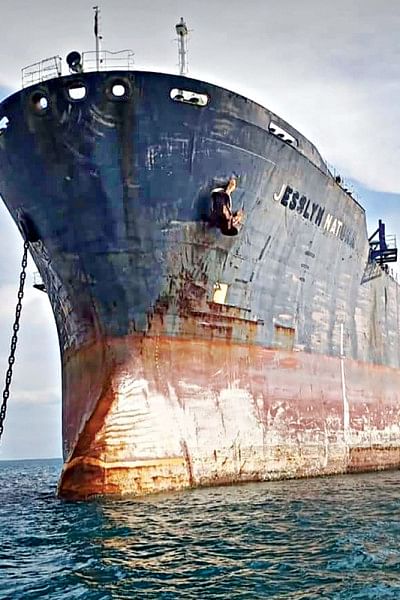Stop the toxic ship from docking at our shores

We are alarmed to learn that a highly toxic ship named J Nat, once used for storing oil by offshore oil and gas companies, is headed towards Bangladesh from Indonesia carrying toxic waste and may reach our coast in a week's time. A local shipbreaking company is illegally importing the ship for scrapping purposes, potentially posing great risks to workers' health and polluting the environment.
With around 1,500 tonnes of mercury-contaminated waste, 60 tonnes of sludge oil, 1,000 tonnes of slop oil, and 500 tonnes of oily water on board, J Nat has toxins such as Polychlorinated Biphenyls, asbestos and other different heavy metals within its structures, making it a ticking time bomb. Samples of the sludge have revealed mercury levels of 395mg/kg, whereas the Hazardous Waste and Ship-breaking Waste Management Rules list mercury and mercury compounds as harmful if their concentration exceeds 50 mg/kg. Regular exposure to such toxins is a severe health hazard and can even lead to death.
The NGO Shipbreaking Platform issued a briefing paper stating that Indonesian authorities appear not to have informed Bangladesh about the presence of hazardous wastes and materials in the vessel, in violation of article VI of the Basel Convention on the Control of Transboundary Movements of Hazardous Waste and their Disposal. On the other hand, the Department of Environment, which issues clearance certificates for scrap vessels in Bangladesh, is not aware of J Nat's import. How is it possible that without any clearance, the vessel is destined for our coast?
Much has been reported in this daily about the plight of workers at the shipbreaking yards as well as the pollution of aquatic resources caused by toxic dumping. Only last month, two workers died and another required medical attention after being exposed to toxic gases. Studies have shown that the biodiversity of Sitakunda is poorer than that of the surrounding areas due to the mismanagement of toxic wastes. Total disregard for human and environment safety seems to be rampant in the field of shipbreaking and the workers do not enjoy any legal protection whatsoever.
Given the situation, the authorities must implement relevant laws to ensure workers' safety and impose proper precautionary measures. Our coastal belt governance demands to be strengthened. The government also needs to immediately investigate the matter and stop J Nat before it reaches our shores and return the vessel so it can follow the decontamination protocol. Bangladesh must be stringent about not allowing ships carrying such toxic waste to come to its shores in the future.

 For all latest news, follow The Daily Star's Google News channel.
For all latest news, follow The Daily Star's Google News channel. 



Comments